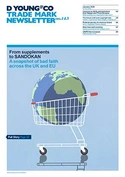Sales of own products qualify as genuine use for retail services: Board of Appeal overturns EUIPO’s restrictive approach
The Board of Appeal has confirmed that retail services limited to the trade mark proprietor’s own products may constitute genuine use under European Union trade mark law, provided they involve more than the mere act of sale. The decision clarifies the interpretation of “retail services” and rejects the restrictive approach taken by the EU Intellectual Property Office (EUIPO) in the recent years.
Background: a restrictive interpretation of retail services
The case concerns the genuine use of the RITUALS trade mark for retail services. Rituals, known for its lifestyle and wellness products, exclusively sells its own products in its own branded shops. The EUIPO’s Cancellation Division questioned whether such activities could be classified as retail services within the meaning of the Nice Classification.
The Cancellation Division relied on the explanatory note to class 35, which defines retail services as “the bringing together, for the benefit of others, of a variety of goods…enabling customers to conveniently view and purchase those goods.” The EUIPO interprets the characteristic “for the benefit of others” narrowly, holding that “others” must be third-party manufacturers or trade mark proprietors seeking an outlet for their goods. Since Rituals sells only its own products, the Cancellation Division considered its activities to be nothing more than the sale of goods, covered by registrations for the relevant product classes, and not independent retail services.
Rituals’ appeal: the retail experience beyond product sales
Rituals appealed to the Board of Appeal, emphasising that its retail model goes beyond the simple sale of goods. In its stores, customers can test products (for example, handwashing with Rituals soaps), enjoy Rituals-branded tea, receive demonstrations and treatments from trained staff (for example, hand massage), attend workshops and classes, personalise products, and access digital services such as mindfulness and yoga apps.
The Board of Appeal’s decision: alignment with the CJEU’s Praktiker judgment
The Board of Appeal overturned the Cancellation Division’s decision. It found that retail services are not limited to acting as an outlet for third-party goods. Rather, consistent with the Court of Justice of the European Union’s (CJEU) judgment in Praktiker (C-418/02), retail services comprise both the act of selling goods and all activities aimed at encouraging the conclusion of sales transactions. Accordingly, retail services are to be understood as follows:
- The objective of retail trade is the sale of goods to consumers.
- Retail trade includes the legal sales transaction together with all activity carried out by the trader for the purpose of encouraging the conclusion of that sales transaction.
- Such activity consists, inter alia, in selecting an assortment of goods offered for sale, and offering a variety of services aimed at inducing the consumer to conclude the transaction with the trader in question rather than with a competitor.
Applying this definition, the Board of Appeal found that Rituals’ retail model fits within the scope of retail services. It recognised that Rituals operates a retail model including curated product assortments, in-store demonstrations, customer experiences (for example, hand massages, tea rituals), and a selective distribution system with strict brand guidelines and support for authorised retail partners. These activities are aimed at facilitating purchasing decisions and enhancing the consumer experience, thus fulfilling the definition of retail services.
The Board of Appeal further emphasised that the characteristic “for the benefit of others” should not be considered limited to other manufacturers or trade mark proprietors, as the EUIPO currently interprets it. Consumers themselves are “others” who can benefit from the retailer’s services. In fact, in view of the Board of Appeal “retail services are there also, and above all, for the benefit of the consumer”.
Implications of the decision
Whether the decision represents a shift from the EUIPO’s established position on mono-brand stores remains to be seen. What is clear is that offering a comprehensive shopping “experience” aimed at boosting sales can constitute genuine use for retail services, even where only the trade mark proprietor’s own products are sold.
While much will depend on the quality of evidence and reasoning in each case, the decision provides mono-brand retailers with greater confidence in invoking and defending class 35 registrations for retail services.
Case details at a glance
Jurisdiction: European UnionDecision level: Board of Appeal
Parties: Rituals International Trademarks BV v Zheni Aleksieva
Citation: R2472/2023-4
Date: 12 May 2025
Decision: dycip.com/tm-rituals-r2472-2023-4

